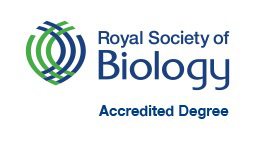Veterinary Biosciences Code D906 Attend an Open Day Attend an Open Day
Apply NowKey Facts
D906-
UCAS Tariff
128 - 104
-
Course duration
3 years
Available for September start 2026
Further details on entry requirements
Apply NowVeterinary Biosciences at Aberystwyth University is dedicated to the biology underpinning veterinary medicine. You will explore the biology of farm animals, horses, and companion animals. This degree programme will also provide a suitable pathway to a veterinary medicine course, with other exciting career options including veterinary laboratory diagnostician, nutritionist or animal health researcher.
This course is accredited by the Royal Society of Biology.
Course Overview
Modules September start - 2026
Please note: The modules listed below are those currently intended for delivery during the next academic year and may be subject to change. They are included here to give an indication of how the course is structured.
| Module Name | Module Code | Credit Value |
|---|---|---|
| Cell Biology * | BR17520 | 20 |
| Disease Diagnosis and Control | BR15420 | 20 |
| Domestic Animal Anatomy and Physiology | BR16920 | 20 |
| Genetics, Evolution and Diversity | BR17120 | 20 |
| Skills for Animal, Equine and Veterinary Bioscientists in Equine Exercise Physiology * | BR17220 | 20 |
Options
| Module Name | Module Code | Credit Value |
|---|---|---|
| Introduction to Livestock Production and Science | BR17020 | 20 |
| Microbial and Plant Diversity * | BR19920 | 20 |
| Module Name | Module Code | Credit Value |
|---|---|---|
| Animal Breeding: Genetics and Reproduction | BR25220 | 20 |
| Immunology | BR22220 | 20 |
| Research Methods * | BR27520 | 20 |
| Veterinary Health | BR27120 | 20 |
Options
| Module Name | Module Code | Credit Value |
|---|---|---|
| Applied Nutrition of Livestock, Horses and Companion Animals | BR20720 | 20 |
| Human, Equine and Canine Exercise Physiology and Locomotion | BR25320 | 20 |
| Livestock Production and Management | BR28020 | 20 |
| One Health Microbiology | BR26520 | 20 |
| Practical and Professional Skills in Microbiology | BR24720 | 20 |
| Vertebrate Zoology | BR26820 | 20 |
| Module Name | Module Code | Credit Value |
|---|---|---|
| Behaviour and Welfare of Domesticated Animals | BR35120 | 20 |
| Research Project * | BR36440 | 40 |
| Veterinary Infectious Diseases | BR34120 | 20 |
| Veterinary Pharmacology and Disease Control | BR36820 | 20 |
Options
| Module Name | Module Code | Credit Value |
|---|---|---|
| Behavioural Neurobiology | BR35320 | 20 |
| Bioinformatics and Functional Genomics | BR37120 | 20 |
| Equine Nutrition and Pasture Management | BR35720 | 20 |
| International Animal Health Study Tour | BR39220 | 20 |
| Livestock Production Science | BR30820 | 20 |
* Also available partially or entirely through the medium of Welsh
Careers
Teaching & Learning
Typical Entry Requirements
UCAS Tariff 128 - 104
A Levels ABB-BCC with B in Biology
GCSE requirements (minimum grade C/4):
English or Welsh, Science and Mathematics
BTEC National Diploma:
DDD-DDM in a specified subject
International Baccalaureate:
30-28 with 5 points in Biology at Higher Level
European Baccalaureate:
75%-65% overall with 7 in Biology
English Language Requirements:
See our Undergraduate English Language Requirements for this course. Pre-sessional English Programmes are also available for students who do not meet our English Language Requirements.
Country Specific Entry Requirements:
International students whose qualification is not listed on this page, can check our Country Specific Entry Requirements for further information.
The University welcomes undergraduate applications from students studying the Access to Higher Education Diploma or T-level qualifications, provided that relevant subject content and learning outcomes are met. We are not able to accept Access to Higher Education Diplomas or T-levels as a general qualification for every undergraduate degree course.
Our inclusive admissions policy values breadth as well as depth of study. Applicants are selected on their own individual merits and offers can vary. If you would like to check the eligibility of your qualifications before submitting an application, please contact the Undergraduate Admissions Office for advice and guidance.

